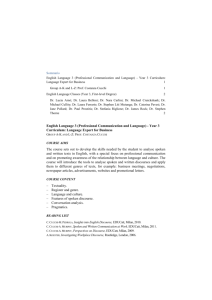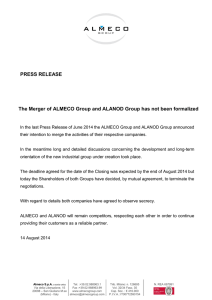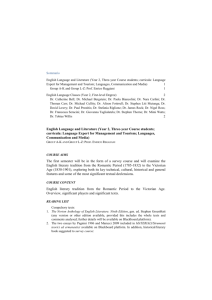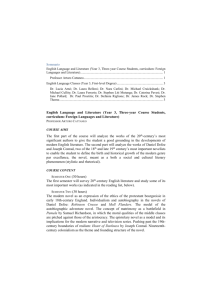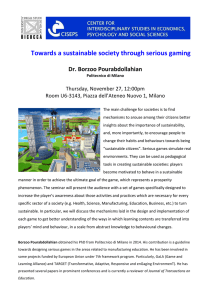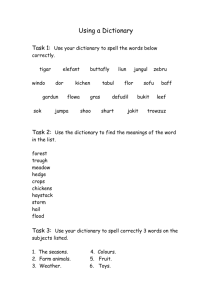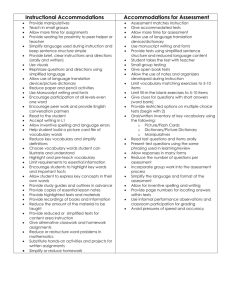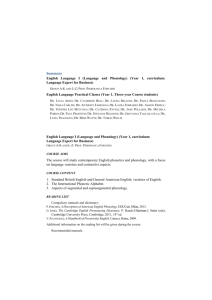English Language III
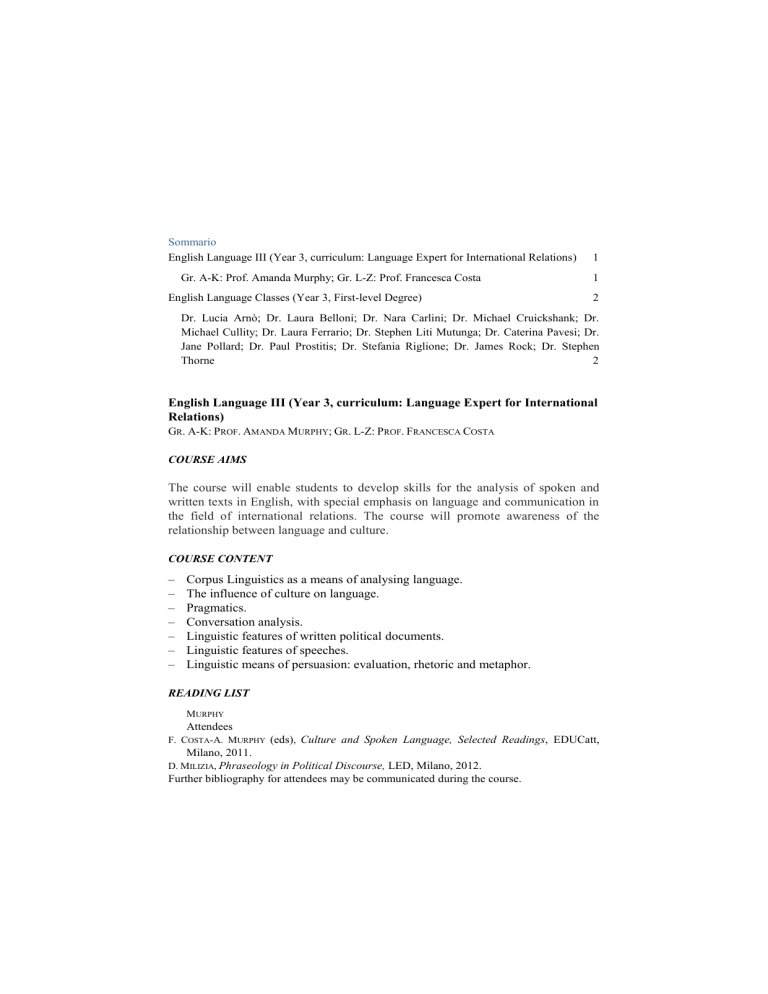
Sommario
English Language III (Year 3, curriculum: Language Expert for International Relations) 1
Gr. A-K: Prof. Amanda Murphy; Gr. L-Z: Prof. Francesca Costa 1
English Language Classes (Year 3, First-level Degree) 2
Dr. Lucia Arnò; Dr. Laura Belloni; Dr. Nara Carlini; Dr. Michael Cruickshank; Dr.
Michael Cullity; Dr. Laura Ferrario; Dr. Stephen Liti Mutunga; Dr. Caterina Pavesi; Dr.
Jane Pollard; Dr. Paul Prostitis; Dr. Stefania Riglione; Dr. James Rock; Dr. Stephen
English Language III (Year 3, curriculum: Language Expert for International
Relations)
G
R
.
A-K: P
ROF
.
A
MANDA
M
URPHY
; G
R
.
L-Z: P
ROF
.
F
RANCESCA
C
OSTA
COURSE AIMS
The course will enable students to develop skills for the analysis of spoken and written texts in English, with special emphasis on language and communication in the field of international relations. The course will promote awareness of the relationship between language and culture.
COURSE CONTENT
– Corpus Linguistics as a means of analysing language.
– The influence of culture on language.
– Pragmatics.
– Conversation analysis.
– Linguistic features of written political documents.
– Linguistic features of speeches.
– Linguistic means of persuasion: evaluation, rhetoric and metaphor.
READING LIST
M URPHY
Attendees
F.
C OSTA -A.
M URPHY
(eds) , Culture and Spoken Language, Selected Readings , EDUCatt,
Milano, 2011.
D.
M
ILIZIA
, Phraseology in Political Discourse, LED, Milano, 2012.
Further bibliography for attendees may be communicated during the course.
N ON ATTENDEES ALSO C.
C UCCHI , Language, Culture and Politics , EDUCatt, Milano, 2011.
C OSTA
A.
P ARTINGTON -C.
T AYLOR , Persuasion in Politics, LED, Milano, 2010, 2 nd ed.
C.
C UCCHI , Language, Culture and Politics , EDUCatt, Milano, 2011.
F.
C OSTA -A.
M URPHY
Milano, 2011.
(eds) , Culture and Spoken Language, Selected Readings , EDUCatt,
Suggested extra readings
P.
C HILTON , Analysing Political Discourse, Routledge, London, 2004.
TEACHING METHOD
Lectures, Group presentations, Practical Sessions.
ASSESSMENT METHOD
Students may take a partial written test before taking the final oral exam.
NOTES
The course is taught in English. Students are required to enrol in the course on
Blackboard.
Further information can be found on the lecturer's webpage at http://www2.unicatt.it/unicattolica/docenti/index.html or on the Faculty notice board.
English Language Classes (Year 3, First-level Degree)
D
R
.
L
UCIA
A
RNÒ
; D
R
.
L
AURA
B
ELLONI
; D
R
.
N
ARA
C
ARLINI
; D
R
.
M
ICHAEL
C
RUICKSHANK
;
D
R
.
M
ICHAEL
C
ULLITY
; D
R
.
L
AURA
F
ERRARIO
; D
R
.
S
TEPHEN
L
ITI
M
UTUNGA
; D
R
.
C
ATERINA
P
AVESI
; D
R
.
J
ANE
P
OLLARD
; D
R
.
P
AUL
P
ROSTITIS
; D
R
.
S
TEFANIA
R
IGLIONE
; D
R
.
J
AMES
R
OCK
;
D
R
.
S
TEPHEN
T
HORNE
COURSE AIMS
Overall, the course aims to equip the student with in-depth knowledge of the specific linguistics and terminology of their chosen field of study and develop their written and oral abilities to use English in their selected professions. Special emphasis will be placed on expanding their lexical repertoire, including the use of idiomatic phrases. At the end of the course, the student is expected to demonstrate that they have learned the implicit and explicit meanings of the texts handed out in class and the key points to emerge from the authentic audio texts that discuss
difficult subjects, even when these are not specifically indicated. Translation is an integral part of the course, both from English to Italian and vice versa.
COURSE CONTENT
The students will be given a vast range of materials carefully selected from the internet, newspapers and magazines in line with their chosen field of study. The material will be provided in various formats, including written documents, graphic and visual information and audio texts. The course incorporates a translation module and will enable the student to translate authentic texts related to their chosen field of study.
READING LIST
Students are invited to obtain a monolingual and a bilingual dictionary to refer to throughout their entire study programme.
Recommended dictionaries:
Bilingual
Il Sansoni Italiano-Inglese , Sansoni, 2010 (5 th ed.)
Grande Dizionario Hoepli Inglese con CD-ROM , Hoepli, 2007.
Il Dizionario Inglese Italiano Ragazzini , Zanichelli, 2012.
Monolingual
Advanced Dictionary , Collins Cobuild, 2008 (6 th ed.).
Advanced Learners Dictionary , Cambridge, 2010 (3 rd ed.).
Advanced Learners Dictionary , Oxford, 2010 (8 th ed.).
English Dictionary for Advanced Learners , Macmillan, 2007 (2 nd ed.).
Compulsory text:
Specific materials will be given for each curriculum.
Additional recommended materials:
C.
T AYLOR , Language to Language, Cambridge University Press, Cambridge, 1998.
M ACMILLAN , Collocations Dictionary, Michael Rundell ed., London, 2010. or
O XFORD , Oxford Collocations Dictonary, C. McIntosh ed., Oxford and New York, 2009.
TEACHING METHOD
Lectures.
ASSESSMENT METHOD
Written and oral exams.
The written exam is in two parts: the first part has a duration of 1 hour 40 minutes and consists of a translation from Italian into English and a translation from English into Italian.
Students are allowed to use a monolingual dictionary (Italian or English); the second part, of
1 hour 15 minutes duration, will test the student’s comprehension and drawing up of a written text, knowledge of vocabulary through a quiz and their listening comprehension ability. No dictionaries are allowed for this part of the exam.
The oral exam will require the student to discuss a selection of the literature indicated during the academic year and test their oral comprehension and production and interactive skills. The student is expected to demonstrate phonetic-phonologic correctness, communicative naturalness, grammaticaql accuracy, and an appropriate use of the lexicon, as well as a good knowledge of the texts read in the course and the ability to discuss related topics.
NOTES
To ensure consistency in numbers and level, the students are kindly requested to attend the course they have been specifically assigned to.
Third-year students who still need to pass the English Language 2 written and/or oral exam must necessarily attend the semester recovery course scheduled for Semester One and repeated in Semester Two.
Further information can be found on the lecturer's webpage at http://docenti.unicatt.it/web/searchByName.do?language=ENG, or on the Faculty notice board.
